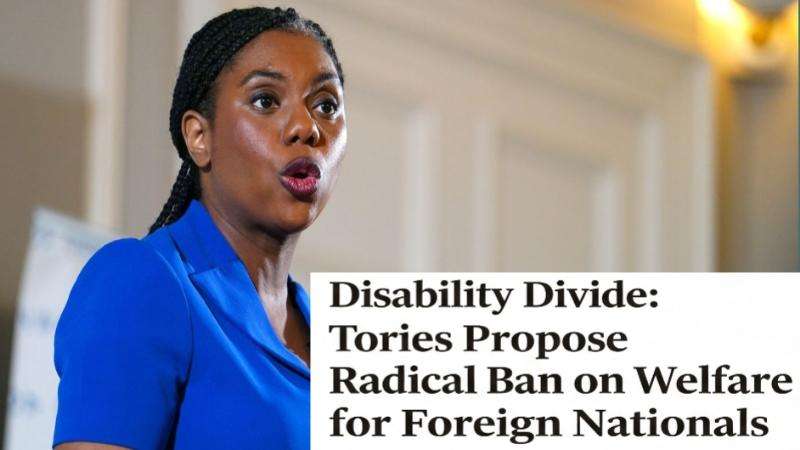Tories Unveil Controversial Plan: Barring Foreigners from Disability Benefits– In a move set to ignite a fierce political debate, the Conservative party has unveiled a controversial proposal to bar foreign nationals from claiming key disability benefits, including Personal Independence Payments (PIPs) and sickness top-ups to Universal Credit. The party asserts that this radical step is necessary to curb Britain's burgeoning welfare bill, which has seen claims by households with at least one foreign national reportedly double to almost £1 billion a month.
Kemi Badenoch, the Conservative leader, is poised to make welfare reform a central pillar of her upcoming speech, explicitly drawing a dividing line between the Tories, Labour, and the Reform Party. This aggressive stance comes in the wake of Labour leader Sir Keir Starmer's recent, humiliating reversal on his own benefits reforms, which has reportedly left a £5 billion hole in the national finances, prompting speculation of impending tax rises.
Helen Whately, the shadow work and pensions secretary, articulated the Conservative position, stating, "The Government’s welfare plans are in chaos. Instead of saving money, the welfare Bill we’re voting on next week costs money." She went on to outline the Tory solution: "Stop signing people off sick for mental health problems like anxiety, bring back face-to-face assessments, and only give sickness benefits to British citizens." Whately contended that adopting even one of these proposals could "save billions – and spare the country from more tax rises this autumn."
Under the proposed Tory plans, PIPs (worth up to £750 a month for mobility issues) and both categories of Universal Credit health top-ups (£423 a month for those unable to work, and £158 a month for those preparing for employment) would be exclusively limited "to British citizens, excluding all foreign nationals." A notable exception would be made for EU citizens with settled status, who are protected by the Brexit agreement.
This initiative is a direct fulfillment of a commitment made by Mrs. Badenoch in December, where she vowed to explore restrictions on "the access of migrants and any dependents to welfare," emphasizing the need to "look after British citizens first." The proposals are set to be tabled as amendments to Labour’s welfare Bill in the coming week.
Further amendments proposed by the Conservatives include mandating face-to-face assessments for all PIP awards, citing concerns that remote assessments allow claimants to "game" the system, with award rates reportedly 13 percent higher when conducted remotely. The party also seeks to prevent conditions such as anxiety, mild depression, and ADHD from being classified as "severe conditions" within the benefits system.
The timing of these proposals coincides with growing scrutiny over disability benefit spending. Figures from the Office for Budget Responsibility project spending on all disability benefits to surge from £39 billion in 2023-24 to a staggering £58 billion by 2028-29. This includes PIP, which has seen an "explosion" in claimants for mental health reasons, with the Telegraph recently reporting payments being doled out for conditions as minor as acne and writer's cramp. Last year alone, a record 531 people per day were granted PIPs for mental health problems.
Mrs. Badenoch is expected to challenge Labour and Reform to match her party's commitment to welfare budget cuts, even as Labour rebels reportedly consider forcing Sir Keir's hand on scrapping the two-child benefit cap, a move that would cost an estimated £3.4 billion annually. "The Conservatives are now the only party committed to serious welfare reform," Mrs. Badenoch is anticipated to declare, "We are the only party that is prepared to take the tough decisions to get spending under control."
A Divisive Divide: Critiquing the Tories' "Foreigner" Welfare Stance
The Conservative party's proposal to bar foreign nationals from claiming disability benefits, couched in the rhetoric of "looking after British citizens first" and cutting the welfare bill, reveals a deeply problematic and divisive description of "foreigners." This policy, championed by Kemi Badenoch, paints individuals who are not "British citizens" as an inherent drain on the public purse, implicitly categorizing them as secondary in need and less deserving of support, regardless of their contributions or circumstances within the UK.
The Tories' definition of "foreigner" in this context appears to be broad and exclusionary. While acknowledging an exception for EU citizens with settled status due to Brexit agreements, the proposal broadly targets "all foreign nationals." This fails to differentiate between long-term residents who have paid taxes for years, individuals on work visas contributing significantly to the economy, or even those who may have come to the UK through legitimate channels and developed health conditions. By painting such a wide brush, the policy risks demonizing an entire demographic and fostering a narrative that overlooks the diverse realities of non-British citizens living and working in the country.
The notion that "foreigners" are disproportionately responsible for the welfare bill's increase is presented as a primary justification. While the news item states that "the cost of benefits claims by households with at least one foreign national has doubled to nearly £1 billion a month," this figure requires crucial context. It doesn't clarify the percentage of the overall welfare budget this represents, nor does it account for the significant tax contributions made by foreign nationals. The implication that their claims are inherently illegitimate or excessive, leading to a "drain," is a dangerous generalization that could stoke xenophobia.
Furthermore, the Conservatives' focus on this particular group seems to deflect from broader systemic issues within the welfare system. Instead of addressing the root causes of rising disability claims, such as an aging population, increased diagnoses of mental health conditions, or inadequate support services, the party opts for a seemingly easy, yet ethically questionable, target.
The proposal also carries a discriminatory undertone. Disability benefits are designed to support individuals facing higher living costs due to health conditions or disabilities, regardless of their nationality. To deny such support based solely on citizenship status creates a two-tiered system where human need is contingent on passport colour. This raises serious questions about Britain's commitment to universal human rights and its responsibilities to all residents within its borders.
Finally, the Tories' assertion that they are "the only party committed to serious welfare reform" and "prepared to take the tough decisions" rings hollow when their "tough decisions" disproportionately affect vulnerable groups and scapegoat non-citizens. True welfare reform should be about creating a more efficient, equitable, and supportive system for all who genuinely need it, not about erecting discriminatory barriers based on nationality. This proposal, therefore, stands not as a pragmatic solution but as a politically charged move that risks deepening social divisions and undermining the fundamental principles of a compassionate society.








.svg)


_3.jpg)
_3.jpg)